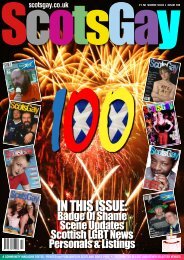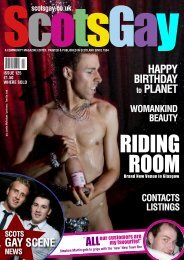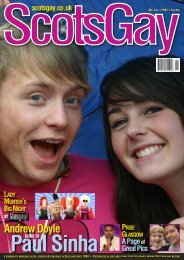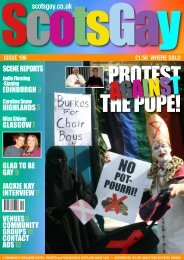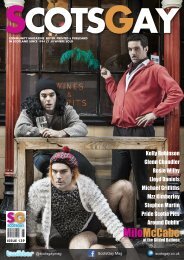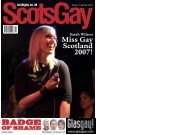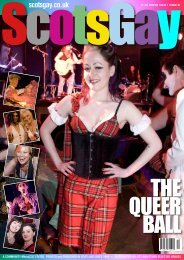You also want an ePaper? Increase the reach of your titles
YUMPU automatically turns print PDFs into web optimized ePapers that Google loves.
SG <strong>fringe</strong><br />
check out more <strong>fringe</strong> reviews at<br />
scotsgay.co.uk<br />
A working-class boy from Stoke<br />
Newington, Bourne has enjoyed a successful<br />
career in the theatre, whilst being an active<br />
force for change as part of the Gay Liberation<br />
Front. He embraced drag in the 60s, at a time<br />
when transvestism was not only considered<br />
outlandish, but was also perilous. He spent a<br />
number of years in a hedonistic drag commune<br />
and, appropriately enough, is best remembered<br />
on the Edinburgh <strong>fringe</strong> for his brilliant<br />
portrayal of the flamboyant Quentin Crisp in Tim<br />
Fountain’s Resident Alien.<br />
Bourne’s life would make for a fascinating<br />
autobiographical book, but Ravenhill’s conceit<br />
in this production is inspired. Sharing these<br />
three hours with the man himself feels like a<br />
privilege. Not once falling into the trap of<br />
sentimentality, Bourne tells his life story with<br />
such candour and charm that we feel somehow<br />
directly implicated in his memories. As<br />
Ravenhill rightly points out in his introduction<br />
to the playtext, “to get the essence of Bette we<br />
needed to see him showing off, singing and<br />
telling stories”. The effect is heightened by the<br />
photographs from Bourne’s past, projected onto<br />
the upstage screen throughout their<br />
conversation. Bourne captures some of the<br />
vitality of his youth in his anecdotes, and to see<br />
him perform against backdrop images of his<br />
former self is a poignant and life-affirming<br />
experience.<br />
To fully appreciate the impact of this piece<br />
you’ll need to see all three acts, each one<br />
presented as a separate performance. But this<br />
moving and often hilarious production will be<br />
one of the best investments of your time in the<br />
festival. AD<br />
Theatre<br />
Little Gem<br />
Traverse<br />
Elaine Murphy’s latest play presents three<br />
women from different generations within a<br />
Dublin family. Kay (Anita Reeves) is a sexually<br />
frustrated woman in her early 60s, caring for<br />
her husband Gem who has been wholly<br />
dependent on her since his stroke. Lorraine<br />
(Hilda Fay) is her middle-aged daughter who,<br />
having experienced something of a breakdown<br />
at work, is looking for a way to bring excitement<br />
back into her life. Her teenage daughter Amber<br />
(Sara Greene) has discovered that she is<br />
pregnant, and is learning to live with the<br />
consequences.<br />
These are familiar challenges in the sphere<br />
of family life, but the unabashed simplicity of<br />
Little Gem is also its strength. Director Paul<br />
Meade has the three women isolated from each<br />
other by spotlights, each occupying their own<br />
small space on the stage. They tell their stories<br />
through direct address, taking turns to offer<br />
more insights into their private concerns and<br />
experiences. It’s not the most original of<br />
concepts, but the form creates the necessary<br />
degree of intimacy for a play that depends so<br />
much on audience empathy.<br />
Hope is burgeoning at the heart of this<br />
piece. As we see Kay’s husband Gem<br />
deteriorate, we learn of Amber’s decision to<br />
name her new baby boy after him; another<br />
simple idea which sees the mourning Kay<br />
enlivened by the possibilities of the future.<br />
Through the simultaneous representation of<br />
these three generations of women, we can see<br />
glimpses of where they have been, and where<br />
they might be going, in the manner of Edward<br />
Albee’s Three Tall Women. Little Gem is a<br />
touching reminder of life’s transience, but also<br />
of its triumphs, and that without our shared<br />
experiences we can barely live at all. AD<br />
Theatre<br />
Little Johnny’s Big Gay Musical<br />
Pleasance Dome<br />
Scottish theatre company, Random<br />
Accomplice, present the return of the musical<br />
spectacular, which was performed to full<br />
houses in 2007 at Glasgow’s gay arts festival,<br />
Glasgay! A one-man show, its star Johnny<br />
McKnight is supported by the gorgeous and<br />
accomplished vocalist Natalie Toyne, and his<br />
band: Karen McIver, Marion Christie and Neil<br />
Cameron.<br />
McKnight depicts the life of working class<br />
Scots lad Little Johnny, looking back at the<br />
formative years. He vibrantly struts, sashays<br />
and sings his coming out story, with<br />
enthusiasm, energy and a cheeky grin.<br />
This show is an absolute delight to watch.<br />
The real pleasure of it isn’t the camp, the<br />
honesty, McKnight’s graphic turns of phrase,<br />
the accomplished dancing, the cracking vocals,<br />
the band, the costumes, the comedy, the<br />
beautiful set, or even the surprisingly up front<br />
depiction of various types of gay sex. No, the<br />
fact is that this is first and foremost good old<br />
fashioned entertainment, performed really well,<br />
which will have you smiling broadly days later<br />
at its memory. MW<br />
Comedy<br />
Lucy Porter - Fool’s Gold<br />
Pleasance Courtyard<br />
As a small woman on a big stage, I<br />
expected Porter to struggle to maintain a<br />
presence. As soon as she appeared however, it<br />
became all too clear that this would not be a<br />
concern. A smile and a wave win her a warm<br />
reception, and she proceeds to address the<br />
latecomers in an opening gambit that could not<br />
have been scripted, a brave move by any<br />
standards. Porter is so easy to like that it’s all<br />
the audience can do to forgive her when she<br />
harasses a minor and accidentally calls<br />
Somerset “retarded,” both with swift apologies.<br />
The jokes are a mixed bag, ranging from a<br />
surreal medical experiment on an audience<br />
member to cheap shots at Michael Jackson and<br />
Jade Goody, but Porter has a manner so<br />
genuine that the weaker material hardly detracts<br />
from the fun. An accomplished and assured<br />
performance. ET<br />
Comedy<br />
Luke Wright<br />
- The Petty Concerns of<br />
Underbelly<br />
The overused term ‘<strong>fringe</strong> favourite’ aptly<br />
applies to stand-up comedian and poet, Luke<br />
Wright. It’s not that he’s improved with age - his<br />
ability was clear when I first saw him around<br />
eight years ago - it’s that every year he has<br />
consistently produced strong and memorable<br />
shows.<br />
In 2009 his theme is ‘petty concerns’, a<br />
self deprecating look at being a ‘nearly famous’<br />
poet who, even though he knows it’s wrong,<br />
can’t help but ‘Google’ his own name when<br />
alone.<br />
There is plenty of comedy to be had from<br />
the outcome of these searches, in a set that<br />
would be strong if stand-up comedy were the<br />
sole attraction. The fact that the gags are<br />
interspersed with sharp, intelligent, often<br />
satirical self penned poems serves to enhance<br />
the show further.<br />
For those that think poetry is boring, I<br />
challenge you to see Luke Wright and not be<br />
thoroughly entertained. MW<br />
Comedy<br />
Marcus Brigstocke - God Collar<br />
Assembly Hall<br />
Marcus Brigstocke, star of Radio 4’s The<br />
Now Show and TV’s Argumental and I’ve Never<br />
Seen Star Wars, is something of a celebrity, and<br />
I am a big fan. If I have learned anything from<br />
years of the <strong>fringe</strong> however, it is that the live<br />
stand-up us festival-goers know and enjoy and<br />
the kind of comedy the general population know<br />
from radio and television are two quite different<br />
creatures. Just as some of the weird and<br />
wonderfully funny acts you see here will never<br />
be commissioned for television, those who<br />
have made it big won’t always deliver under the<br />
pressure of a live gig.<br />
Brigstocke is a wonderfully charming man,<br />
and while the laughs are there, they’re<br />
disappointingly infrequent. Don’t get me<br />
wrong; the man is funny, but he never really<br />
gets the whole room laughing. His stage<br />
presence is somewhat placid for a man who<br />
made his name getting angry, and material<br />
about his kids and a deceased friend is a bit of a<br />
downer. If you’re a fan like me, keep watching<br />
his TV shows, and never meet your idols. ET<br />
Comedy<br />
Mark Thomas - The Manifesto<br />
Stand III<br />
Anyone on the left will be familiar with<br />
Mark’s product. He’s a campaigning,<br />
investigative journalist and writer - his books sit<br />
alongside Naomi Klein, John Pilger and Tony<br />
Cliff on the shelves of progressives. But he is<br />
also a polished and professional stand up<br />
comedian, and so accessible to the masses.<br />
In The Manifesto, he seeks to set a new<br />
political agenda by using policy suggestions<br />
from the audience. At the end of the show the<br />
audience votes, and the winning policy -<br />
alongside those of the other thirteen shows -<br />
gets to be debated with MSPs at a special<br />
meeting held as <strong>ScotsGay</strong> goes to press on<br />
19/08/09 (check our website for an update).<br />
Fourteen shows. Fourteen audiences. Fourteen<br />
policies. An innovative idea.<br />
Mostly though, Mark and the audience are<br />
playing it for laughs. “Ban the Labour Party and<br />
other right wing groups”, and the winner for<br />
tonight: “Require the Daily Mail to print the<br />
following on every front page: ‘This is a fictional<br />
representation of the news. Any resemblance<br />
to real life is purely coincidental’ ” are typical of<br />
the fare on offer from us, the audience. Mark’s<br />
prepared material though, of which there is<br />
plenty, is exceptionally good stuff. This is<br />
genuinely hysterical campaigning satire which<br />
finds the funny in the absurdity of capitalism -<br />
with multinationals, MPs, the police, Bob<br />
Geldolf and arms dealers all getting the<br />
treatment. Where he is different - and better -<br />
than any other popular satirist around today, is<br />
that we are left with no doubt about WHAT WE<br />
CAN DO ABOUT IT.<br />
This show, laugh for laugh, has to be, for<br />
me, the best of the best on this <strong>fringe</strong>. The fact<br />
that it’s also a call to arms has to mean that five<br />
stars aren’t enough. MW<br />
Theatre<br />
Midsummer (A Play with Songs)<br />
Traverse<br />
The sanguine refrain of Midsummer (A<br />
Play with Songs), “change is possible”, is<br />
delivered not by some wizened old sage in a<br />
caftan, but by a ticket machine in Edinburgh’s<br />
Castle Terrace car park. “It’s funny to have a<br />
parking machine doling out philosophical<br />
advice”, remarks Bob, the play’s male character.<br />
But this isn’t a case of the universe offering<br />
inspirational maxims by means of modern<br />
electronic devices (in the manner of the traffic<br />
sign in Steve Martin’s LA Story). Rather, the<br />
implication is that we find inspiration through<br />
the ways in which we choose to interpret the<br />
world around us.<br />
It’s strange that such an uplifting notion<br />
can be found at the heart of a play which is<br />
otherwise concerned with the inevitability of<br />
physical decay. Bob shows the audience<br />
photographs of himself as a child, observing<br />
that the atoms of his youth have long since<br />
disintegrated. But even in this most morbid of<br />
concepts, playwright David Grieg finds humour<br />
and optimism.<br />
Midsummer is a story about the onenight-stand<br />
that doesn’t end. Helena<br />
approaches Bob in an Edinburgh bar and invites<br />
him back to her flat. What begins as an<br />
exercise in sexual gratification soon transforms<br />
into a heady, romantic tour of Scotland’s<br />
capital.<br />
Cora Bissett and Matthew Pidgeon have<br />
excellent on-stage chemistry, successfully<br />
conveying all the excitement of a brand new<br />
relationship and the recklessness that comes<br />
with it. They both play the acoustic guitar<br />
throughout, singing Gordon McIntyre’s uplifting<br />
numbers, all of which brilliantly complement<br />
the rambunctious, knockabout quality of the<br />
piece. It may not be a particularly original<br />
concept, but when a play is this joyous it barely<br />
matters. AD<br />
Theatre<br />
Mother/Son<br />
Sweet Grassmarket<br />
This is a beautiful performance that packs<br />
an emotional punch that will knock you from<br />
here to the end of the festival. I’m not normally<br />
one to get a lump in my throat, but I was<br />
struggling to hold it back by the end.<br />
Solomon’s portrayal of a mother and son<br />
struggling to reconcile the fact that he is gay is<br />
in parts brilliant comedy, in parts stomachchurningly<br />
sad, and throughout is a wonderful<br />
tribute to anyone who has ever come out, and<br />
the family members who have accepted them.<br />
Solomon plays both the part of Bradley,<br />
and of his mother. He does this fantastically<br />
well, adopting the voices and mannerisms with<br />
great skill. He delves into the deeper issues<br />
involved in any family accepting someone as<br />
gay – the denial, the blame, the cure, and then<br />
the rationalisation. Bradley invites his mother<br />
to a gay bar; recommends a Parents & Friends<br />
of Lesbians & Gays Group, and ultimately she<br />
comes out as a radical pro-gay activist who<br />
befriends other waifs and strays whose family<br />
members are not so understanding.<br />
The biggest achievement of this<br />
performance is that it injects emotion into gay<br />
relationships. ‘It’s not just about sex; it’s about<br />
love and companionship’. So much<br />
homophobia is borne from a sexualisation of<br />
gay people, and in this performance Solomon<br />
very successfully achieves portraying the issue<br />
of sexuality as a complete non-issue; whilst<br />
portraying the very sad truth that for so many<br />
people it really is still an issue.<br />
This is a play where love conquers all;<br />
where communication and bravery and using<br />
one’s voice ultimately lead to a close bond and<br />
respect that most of us could only dream of.<br />
This will be one of the most moving hours of<br />
your life to date – and I challenge you to watch<br />
it and leave with dry eyes! JF<br />
Comedy<br />
Mould & Arrowsmith’s<br />
Inventions<br />
Pleasance Dome<br />
Steve Mould and Gemma Arrowsmith are<br />
a charming double act, and their latest offering,<br />
“a geeky sketch comedy”, has some very funny<br />
original ideas.<br />
They hook their hour on a recurring ‘time<br />
machine goes wrong’ gag, utilising concepts<br />
that are deceptively technical in execution.<br />
There are some wonderfully silly PowerPoint<br />
skits, and several jokes using advanced maths<br />
that er, more than add up (sorry). Their off-thecuff<br />
banter with the audience is a joy. They<br />
clearly both relish interaction with the<br />
customers - either one could steal the march on<br />
any improvised sketch show.<br />
Only occasionally do they milk an idea for<br />
a wee bit more than it’s worth, but with comedy<br />
of this high calibre, no-one cares.<br />
Sketch shows are all over the <strong>fringe</strong> this<br />
year - more than ever. This is one of the very<br />
best. I recommend Mould & Arrowsmith to you<br />
without hesitation. MW<br />
Comedy<br />
The Noise Next Door<br />
C Chambers Street<br />
Improvisational comedy is something I am<br />
usually very wary of; at constant risk of looking<br />
contrived, and too regularly requiring the<br />
comedians to work the unworkable and keep it<br />
funny. But, despite my initial reservations, The<br />
Noise Next Door are rare in that they are not<br />
just a good improv group, but they are a<br />
brilliant one. All five of them carry their weight,<br />
and they have clearly been working together for<br />
a while as they all effortlessly set up some<br />
brilliant punchlines for each other, which the<br />
audience appreciates rapturously.<br />
As I said, the most obvious pit-fall of an<br />
improv show is it coming across as contrived,<br />
and too structured, but with The Noise Next<br />
Door, this is not a problem. Working on the<br />
incredibly loose narrative that they have landed<br />
on a mysterious planet, the only obvious<br />
constant in the show was the nature of the<br />
games they’d play.<br />
All in all, it’s a great show that made me<br />
eat my words about improv. JD<br />
Theatre<br />
Once A Catholic<br />
C Chambers Street<br />
This play is a mediocre exploration of<br />
catholic guilt and hypocrisy, as we follow the<br />
curiosities of seven sexually naïve convent girls.<br />
Scenes of nuns force-feeding the girls mashed<br />
potatoes, terrorising them about the evils of<br />
sex, and the priest hurrying along the<br />
confessional so he can make the off-license<br />
before it shuts, are all fairly predictable.<br />
The girls’ acting is, in general, unemotive<br />
and fails to make a connection with the<br />
audience. The shining light of the performance<br />
comes in the form of Derek, the bad boy who<br />
lures the girls into sexual promiscuity. His<br />
acting is phenomenal and he adds a jolt of<br />
enthusiasm into an otherwise bland production.<br />
The show over-ran by an achingly long twentyfive<br />
minutes, by which time I was desperate to<br />
leave. JF<br />
Theatre<br />
Orphans<br />
Traverse<br />
Dennis Kelly’s Orphans opens with a<br />
punch; a quiet evening meal in the suburban<br />
home of married couple Helen and Danny is<br />
interrupted by Helen’s brother Liam, whose<br />
shirt is covered in blood. He seems relatively<br />
unconcerned, and it takes some coaxing to<br />
uncover what has happened. Liam’s revelations<br />
are unconvincing and disingenuous, the sort of<br />
responses one might expect of a child or, as in<br />
the case of Liam, a troubled young man whose<br />
transition to adulthood has been disrupted by<br />
traumatic events in his past.<br />
The real story behind the bloody shirt is<br />
revealed gradually through the course of the<br />
play. As we edge nearer towards the truth, the<br />
picture becomes darker and more disturbing,<br />
particularly when both Helen and Danny begin<br />
to implicate themselves in Liam’s crime in order<br />
to protect him from prosecution.<br />
Kelly has explored similar territory before<br />
in DNA, his 2007 piece for the National<br />
Theatre’s Connections series for teenage<br />
audiences, in which a group of children<br />
inadvertently kill one of their friends and are<br />
forced to invent ways to cover up the crime. In<br />
Orphans the stakes are raised, and the<br />
consequences are even more unsettling.<br />
Above all else, Kelly’s play examines the<br />
implications of social mobility. Helen has<br />
married into Danny’s middle-class world, and<br />
due to Liam’s actions is again forced to<br />
They’re back...<br />
‘Fabulous’<br />
confront the unpleasant realities of her former<br />
life. This contrast is brilliantly realised in<br />
Garance Marneur’s evocative set, which<br />
represents Danny’s Ikea-clad home as a porous<br />
and vulnerable place; the railings from the<br />
outside world a constant visible presence<br />
between gaps in the walls, menacing shadows<br />
from outside frequently penetrating the florid<br />
wallpaper within. The effect is suitably<br />
ominous.<br />
It is worth noting that Kelly’s workingclass<br />
characters often seem to lack a moral<br />
compass, a notion which is slightly off-putting<br />
and, moreover, experientially unsound. That<br />
said, this production succeeds on a number of<br />
levels. The performances by Joe Armstrong,<br />
Claire-Louise Cordwell and Jonathan<br />
McGuinness are flawless. Roxana Silbert’s<br />
direction is taut and perfectly paced. Most<br />
impressive of all is Kelly’s dialogue, which veers<br />
from the hard-hitting to the outright hilarious<br />
without ever feeling contrived. Our<br />
expectations are repeatedly confounded, and by<br />
the end it is difficult to know where our<br />
sympathies should lie. This is visceral and<br />
uncompromising theatre. AD<br />
Theatre<br />
‘Gloriously outrageous’<br />
Out of Chaos<br />
Underbelly<br />
Retelling various Greek myths, Out of<br />
Chaos is a superb show, in both concept and<br />
execution. The myths are retold in an<br />
accessible, yet intellectually stimulating way<br />
that is neither dumbed down, nor overly<br />
academic.<br />
Also, the acting here is superlative, with all<br />
six actors working well together to create<br />
pathos, humour, and energy. Offstage, the<br />
quality is just as high; Mike Tweddle’s direction<br />
is slick and imaginative.<br />
All in all, this is a brilliant production<br />
which succeeds in bringing physical theatre to a<br />
wider audience in an unintimidating way. JD<br />
Scotsman<br />
Chortle<br />
‘Witty, sharp and very funny’<br />
Times<br />
‘Has the audience gasping for more’<br />
STAND THREE VENUE 12<br />
tickets 0131 558 7272<br />
Comedy<br />
Paul Foot: By the Yard<br />
Underbelly<br />
Oxford graduate Paul Foot doesn’t tell<br />
jokes, as much as have an occasional idea. He<br />
bumbles on the stage, sees a stool that<br />
apparently shouldn’t be there, and then with<br />
fumbling and pin-point accurate observational<br />
humour makes us all laugh about it for fifteen<br />
minutes. I say all, perhaps I should say about<br />
two thirds of this capacity audience. A sizable<br />
minority sat stony faced during, well, not just<br />
this routine but the entire show.<br />
Foot’s appearance is ill-fitting and funny.<br />
The clothes are wrong. His hair defies<br />
description. It’s quite old-fashioned, but the<br />
way he looks and indeed, everything he does, is<br />
designed to make you laugh. The fact that<br />
some don’t get it simply makes it funnier.<br />
Suck it and see. You’ll either become a fan<br />
for life and join his growing band of<br />
connoisseurs, or you won’t. MW<br />
List



